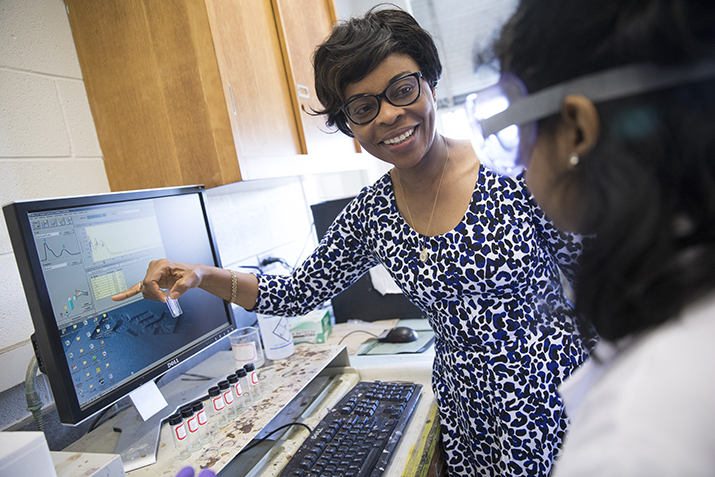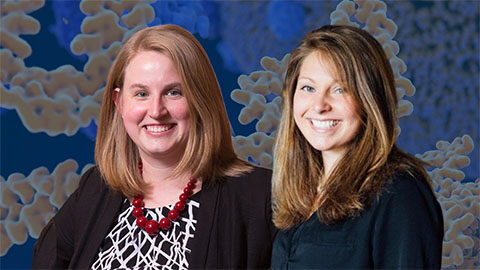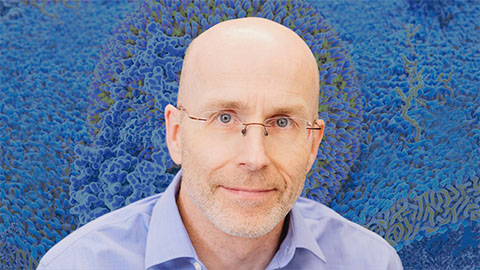Chemist got her start a world away
Omowunmi A. “Wunmi” Sadik is a professor of chemistry and director of the Center for Research in Advanced Sensing Technologies and Environmental Sustainability, known as CREATES, at the State University of New York at Binghamton. Her interest in chemistry has carried her across the globe, from teaching and research in Nigeria to a Ph.D. in Australia and to her current position in upstate New York. Her answers, originally published on the minority affairs page of asbmb.org, have been edited.

What are the key experiences and decisions you made that have helped you reach your current position?
After I graduated at the top of my class in chemistry at the University of Lagos in Nigeria, my professors suggested that I should enter a Ph.D. program. I decided to earn my master’s degree first, because I was actually unsure of whether the career paths that came out of doctoral study appealed to me, despite my love of chemistry itself. After completing my master’s degree at the University of Lagos, I worked briefly as a high school chemistry teacher and then later joined the Nigerian Institute for Oceanography and Marine Research as a research scientist. I never planned to go into academia, even though I enjoyed my job as a research scientist. I eventually decided to pursue a Ph.D. after realizing that one could not be a successful researcher without one. I resigned from NIOMR about two years later, after winning a scholarship to pursue a Ph.D. at the University of Wollongong in Australia.
How did you first become interested in science?
My parents never made any distinction between me and my brothers. My father was the first person to teach me the multiplication tables. He also taught me how to read a clock and a host of other basic things. He emphasized the basic sciences as a pathway. In fact, one of my brothers, Yomi, was the first to teach me stoichiometry! He had learned this in school, and we always studied together when we were young. He loved chemistry, physics and math but did not like biology and hated to draw.
Yomi taught me science trivia. He would rattle off things like “Why does ether disappear on your skin?” I was a very curious learner, and I asked lots of questions. Yomi became a civil engineer, and three of my siblings are medical doctors. One sister is an OB-GYN, and another brother is in the same profession. All of my sisters are in the medical profession as doctors, nurse practitioners or nurses. One brother went into accounting. We all were encouraged to try our best and always to try to be in the top tier of our class.
Were there times when you failed at something you felt was critical to your path? If so, how did you regroup and get back on track?
I have failed at many things in my life, but I don’t give up.
What advice would you give to young persons from underrepresented backgrounds who want to pursue a career in science similar to yours?
I would tell them to be persistent, to have a true love for what they do and to develop the ability to see beyond their limitations. I believe that perseverance, risk-taking and luck play important roles in discovery and that, as scientists, they should not be afraid of challenging the conventional wisdom. For me, I have found out that the enduring desire to know is much more compelling than the short-lived excitement of discovery. If this is your goal, your passion and what you love, stick with it. But remember that you will need a lot of good time management and guts. You can do it.
What are your hobbies?
I enjoy swimming.
Do you have any heroes, heroines or role models?
My dad.
What is it that keeps you working hard and studying science every day?
I enjoy applying my knowledge of chemistry to solve real-life problems. I want to find ways to apply my research experience to address the problems at hand. This was my main motivation for enrolling in a chemistry Ph.D. program, and this has continued to form the basis of the research that I do to this day.
Enjoy reading ASBMB Today?
Become a member to receive the print edition four times a year and the digital edition monthly.
Learn moreGet the latest from ASBMB Today
Enter your email address, and we’ll send you a weekly email with recent articles, interviews and more.
Latest in People
People highlights or most popular articles

Redefining lipid biology from droplets to ferroptosis
James Olzmann will receive the ASBMB Avanti Award in Lipids at the ASBMB Annual Meeting, March 7–10, just outside of Washington, D.C.

Creating change in biochemistry education
Pamela Mertz will receive the ASBMB William C. Rose Award for Exemplary Contributions to Education at the ASBMB Annual Meeting, March 7-10 in Washington, D.C.

Amacher, Pollock named Henry Dreyfus scholars
They were recognized for their outstanding research scholarship and a deep commitment to undergraduate education and each received $75,000 to fund their research.

Trainee mentorship as immortality
Suzanne Barbour will receive the ASBMB Sustained Leadership Award at the ASBMB Annual Meeting, March 7-10 in Washington, D.C.

Life in four dimensions: When biology outpaces the brain
Nobel laureate Eric Betzig will discuss his research on information transfer in biology from proteins to organisms at the 2026 ASBMB Annual Meeting.

Fasting, fat and the molecular switches that keep us alive
Nutritional biochemist and JLR AE Sander Kersten has spent decades uncovering how the body adapts to fasting. His discoveries on lipid metabolism and gene regulation reveal how our ancient survival mechanisms may hold keys to modern metabolic health.
